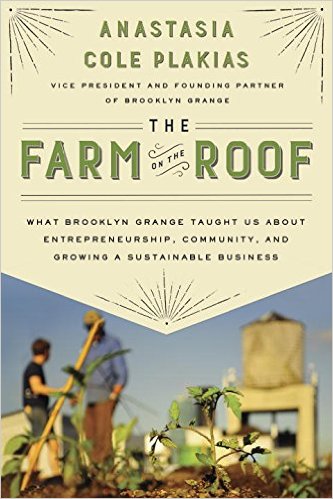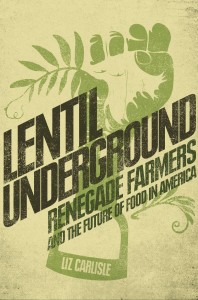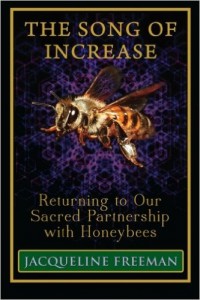RAW: Identify 5 Bees + 10 tips to Use In Your Garden Tomorrow | PolliNation Podcast | Dr. Andony Melathopoulos | Assistant Professor Pollinator Health Extension | Corvallis, OR
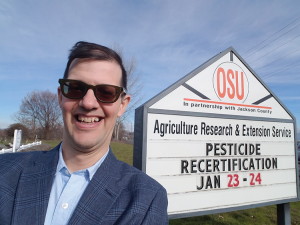
Do you want to know how to recognize Bees in your garden and neighborhood? Do you want to plant flowers that will invite more bees to your garden? I’m super excited because for Earth Week, it’s April 27,2019. I have the Assistant Professor Pollinator Health Extension from the Department of Horticulture | Oregon State University, Dr. Andony Melathopoulos from the Pollination Podcast!
Oh there’s more then one bee?! When I do master gardener training is I help people identify 5 bees that are in North America. When you garden for bees it gets kind of complicated. If you can identify these 5 bees then you can go visit a neighbor’s garden and say oh! I see that bee on this plant.
Identify 5 Bees | 10 tips to use in their garden tomorrow cheat sheet
Pollinator Habit
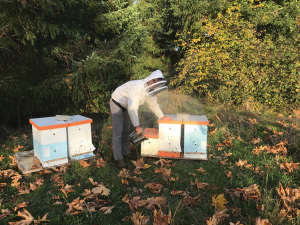
Tell us a little about yourself.
I’m in beautiful Oregon
looking out the window in Oregon
- Horthornes are just starting to come into bloom
- Ceanothus the California Lilac
Tell me about your first natural or gardening experience? How did you fall in love with horticulture?
I was an urban kid, I remember I come from a Greek immigrant family. I remember my aunts and uncles having great tomatoes and going to Greece and the produce there that just tastes wonderful.
I remember starting to do it myself in my late 20s in the most northern part of Canada
In the Peace River District where we would get a frost August first so we grew a lot of Kale!
Where is that? Nova Scotia or the Yukon?
It’s mile 0 of the Alaska Highway. It’s the most northern growing area in the US.
the one things that lovely when it hits solstice.
sun dips down around three and then just pops up again
You get this really long exceedingly quick and rapid growing season It’s amazing!
The downside is you’re always dodging the frost
One year I had the audacity to grow tomatoes and the ones that grew they were the size of a marble I was like I’m learning!
What could you grow? Could you grow potatoes?
potatoes
frost pocket
I was working at the aG Canada research stations
It started because it was so far from anywhere the idea was to make people self sufficient
- prairies
- Northern climate
fruit trees
- hapscas
- apple orchard
You have to adapt your gardening for it, it’s tricky, but there are ways to get around things. People were always pushing your envelope
For me as a beginning gardener I struck to the fundamentals
- great garlic
- tomatoes
- cherry tomatoes maybe but doing real tomatoes was beyond my pay grade at the time.
Me too, I stick to cherry tomatoes in Montana.
Tell us about the bees
This is how I start it off
the first thing we are confronted with these plant lists. You can go anywhere on the internet and type pollinators and plants and they spit out these lists
problem with the lists
they’re ok
There’s lots of good plants on them
But there are a lot of bees!
there are not just honey bees
yellow jackets
I get calls all the time
- yellow jackets
- hornets
different groups bees and wasps are closely related
thing with bees
You can always tell a bee
if it’s carrying pollen on it’s body
not all bees do
BUT IF YOU SEE a lump of pollen on an insect flying through the air it’s a bee!
Their protein comes from pollen! They’re vegetarians!
BEES! No other insect that relies on pollen and nectar and for it’s life!
radical turn towards the flowers
ok
yellow jackets and hornets are not bees
What’s a bee?
honeybees
bumble bees
mason bees (you had a great episode on mason bees!)
There are 800 bees
Colletes Cellophane bees
If you go on your goldenrod
little specs with a white dot on their face you’d never think they were bees
they’re so small!
You would never think they are bees
If you go to your golden rod in the late summer
you’ll see a spec with a dot
little critters going from flower to flower those are bees
It’s intimidating
They’re not going to be out at the same time of year
coming out at different times of year
just getting a plant list aint gonna cut it you are going to need to pay attention to the bees in your backyard!
I can five you today special
Once you see those five bees, then you can poke around your neighborhood and say this bee is on that flower and start to fill out your garden with plants that are really specific to your area
- don’t have pest problems
- available for nurseries
- local seed growers are growing them
come up with something that works!
Awesome! is that including the tiny one we can’t see? or five others?!
So I gave you six! Bonus just for you!
I would start first of all there’s some confusing things because lots of people want to trade on the bee brand
- wasps sometimes it’s hard to tell them apart
- flies
You have these beneficial flies join your garden
number of genera that look like bees
look at their heads and legs
Bees have chunky back legs. Usually it’s where they carry their pollen
females do, some carry on their bellies
If you look at their heads they have branched antenna sort of elbowed and it sticks out a way
Flies have a nubby antenna
- head is almost entirely eye balls
- fly that looks bee like usually their abdomen is thin like a ribbon
- a lot of flies hover
hover flies
great bio control for aphids every organic gardener should be watching for these
real sign that maybe aphid potion
they will hover
Bees don’t hover they dart around
flies and wasps look like them
There’s a couple of things that look like them
flies and wasps
First is a honey bee everyone knows, kind of iconic
- not yellow and back like a wasp
- striped on the back
- light part is leathery brown to kind of gray
real like the bumble bees
pull out
They carry polling a little basket
The females have a spoon on their back leg so they pack the pollen, so it looks like a little lentil
Only bumble bees and honeybees do this
Everyone knows the bumble bees they’re really fuzzy!
Only thing you can get confused with in the southern US are carpenter bees that looks a little similar
look a little
clear difference
bumble bees are gonna carry pollen in their back legs.
Bumble bees big and furry in a few places carpenter bees look like them
got it
lentil shaped pellets
-
honeybees
-
bumblebees
In Oregon we have close to 30 different species all have different color patterns. Carrying pollen in their back legs.
I just have a quick question about the flies? You want the flies, or if you see the flies you should be concerned because you’re getting aphids or it’s a good thing because if you have aphids they are eating them?
The adult flies are not the aphid controllers. It’s the larve
A lot of the same flowers that attract the bees are going to feed those adults so to find those aphids they are going to run off nectar. They go to your flowers looking for nectar and poppin off aphids!
If you start to see them pop up in density, check your plants out
There’s a lot of good aphid controlling insects. It’s one of the
(I’m not a pest management expert)
one of the easiest things to control organically with natural predators if you wait a bit they are going to find them
- lay eggs
- hoover them up like PacMan
- eat aphids like nuts!
They’re good and any of the garden tips are really generalists will go to shallow flower to nectar
When you see them and check the plants out if they are hovering around something if you see them you may say omgosh the aphids! they are going to take care of your aphids.
The next bee you talked about a group you talked about in a previous episode
It’s a big group.

I keep picturing Bee Movie and the Pollen Jocks
I love it that Jerry Seinfeld had one thing, after he finished Seinfeld there was one project he wanted to do, which was make the BEE Movie.
Because of Bee MOVIE when I’m down there watching our bees I notice the pollen jocks. We have had a hard time with keeping honeybees alive. I think it’s because my neighbors spray pesticides but we’re not sure.
Honey bees are tricky.
So many things you can do. bees do
- cut comb honey
- queens
- divide them
There are all sorts of tools
We had a great episode with Kim Flottom from
bee culture
He just talked about the history of bee keeping, there is an amazing long history of people keeping bees! It’s amazing!
tricky business
pesticide use
we have a survey where we don’t ask beginning bee keepers why they are not successful. Most often they don’t feed them enough
80% of the situations the colonies run out of food
He started a magazine called
beekeeping in your first three years
often times
If you think your gonna watch some youtube
It really does require mentorship, it’s tricky to get up and running. You can have these problems like a neighbor who sprays pesticide
any gardening
You need a strong skill set to pull it off
I always worry there’s a lot of people getting into bees because of conservation purposes.
I am not going to convince you
- rich habitat
- more
Don’t want to persuade anyone from beekeeping.
We were talking about bumble bees
moest bees are solitary
There’s no queen. A little nest not very big
no nest mates one female doing all the work
different
When you’re doing honeybees you’re like I know about bees
no, no, no
All the rest of the bees are so different in the ways! They’re all collecting bees.
That interview I did with Olivia from Mason bees? Do you think we will have more success with the honeybees.
Out there in Montana.
I’m an albertan
run out of state
Montana and Alberta honey is some of the nicest on the planet
It’s so mild it smells like cinnamon
I totally get it
getting fresh honey and be able to put it on toast
It’s super healthy for you, it’s good for your immune system and if you want natural sugar and I think there are people who say a teaspoon of sugar a day is good for you.
especially for baking too
easier for digestion
- moisture
- flavor
- aroma
there’s something I eat sugar I admit
there’s something
honey
you get walloped with these
- smells
- textures
it’s like one of the most
no processing
They take the wax off
heat to separate out the wax
pretty simple stuff
You make it simple. The first year we had them we just used our last pint of it last year it was a few years ago we had . I think we got the bees in 2014? They all just swarmed and then last year a swarm came back and I thought we were gonna get a new hive and move into one of the boxes but they didn’t.
the trick to bee keeping
has multiple ways to do it
maximum population
When the clovers in full bloom you want the maximum population
150 lbs per colony
kind of average they get on the great plains
You have to do a lot of work on the front end.
- That colony can’t swarm
- manage the populations
just like growing anything
If you want to get a really good potato crop
all these things before your tubers even set
don’t do those things
still gonna get hit
from the start of the season until that flow you want to be keeping the colony in motion and moving
queen goes
if you do that you’ll get 150 lbs
so many things can go wrong and if things go wrong they don’t
It’s tricky and it’s expensive we’ve spent a small fortune already on what we’ve gotten!
I’m excited to learn more.
You had Olivia from Rent Mason Bees on the Show
Olivia told you about this next groups
make wax
don’t make wax
the big lipped bees
the Megachilidae
you don’t have to say that
in Oregon we have about 100 species in this group all distinctive becasue the females don’t carry the pollen they carry it on the belly
look under her belly full of pollen
dense hairs on her belly sticks the pollen to it!
that gives this distinctive
only family that has polling on it’s belly
includes their mason bees
make their nest out of mud
- resin bees – make their nest out of resin
- leaf cutting bees – cut pieces of leaf to make their nest
- wool carder bees – see them on lambs-ear
in the Pacific NW for sure in California.
You’ll see the males patrolling the lambs ear and they’ll head butt any bee that
female he’ll let in
shave the hairs nest
little tubes
looking for twigs with a little hollow putting their mud, leaf, wool, resin
wealthier reason
don’t make honey at all.
They take the pollen
- rollout up on a little ball
- lay an egg on it
- wrap it up on a leave
No child care!
never see their offspring!
raspberry cane
house you can bulled out of wood go through the winter
next spring pop out again
In your garden they’re nesting somewhere all around
suddenly when their flowers they are going to come out.
next group of bees
solitary
nest above grond
pollen on their bee
Cool bee #3 Big lipped bees?
truck and trade
lip means their mandibles
The equivalent of a tooth in an insect
- cutting a bit of leaf
- dig up mud
- scrape up resin
They look mean but they are not mean!
They’re really gentle
mason bee
put them in places where the kids rare
The only way they are gonna get stung is if they pick it up and put it in their nostril and smash it.
they are really gentle
mandibles
craft tools
this is my little hatchet
shaving off
lambs ear leaves
big lipped big jawed bees
pollen belly bees
you now have 3 bees flying through your garden!
This is fascinating. This is one of the tips I took away from Olivia was that these are pollinator bees you are going to get more flowers and blooms in your garden! Such better pollinators, I think we are going to get the leaf cutters because it’s later in the season.
That’s not entirely true but is true at the same time
bumblebees are the only thing that will pollinate your tomatoes and blueberries it’s in a tube it’s like a salt shaker you have to shake it up to get pollen out
tomato
hold onto the flower and buzz it
bumblebees are really good at it will set your tomatoes or eggplant or whatever
anything can pollinate them just need a broad range of insects
strawberries
some bees don’t like to go to strawberries is an example of a fruit that will set on it’s own
wind
look at a strawberry plant
move pollen from edge to center sometimes a little knocking will do it so if bees visit it will set a strawberry
zucchinis
squash bees
listeners will have them
there are these bees that just set the squash pollinators ever
Let me back up a little, the impression I got from Olivia, having the mason bees, I was going to have more flowers blooming and by having more flowers blooming was going to attract other bees.
I’d have to go back an listen.
Me too now that I say that, she did say something about.
honeybees
bee that you’ll see
males are all distinctive
In Oregon we have I think 8 species of these
US in Canada
emerald green bee
looks like
front is green but the back end is striped
see that bee it’s a metallic sweat bee
males in this group
- striped
- green
- females are mostly all green
- carry the polling on back legs
don’t have a little spoon on their back leg, but not a little pellet looks like pollen stuck all the way up their leg, in their armpit
Michael mass daisies
you’ll see them, they’re already out here all year long they’re great they are a
beautiful bee
thing about them
life cycle of most bees
most bees live like this
dig a hole int heg orange like a gopher
pollen chamber
lay an egg and they’re done
barely see them very unconspicuous
burry in the ground
oh wasps?!
coming in out of it
one female goes in the hole then she pops out gone for 10 minutes they are all over the garden
100s of species of bees that do that
So do you think people are seeing them and don’t know what they are?
after this episode
I challenge everyone to look for these five bees and spot them
they were here all along
so complete
focusing on things
miss stuff
see my there;s al to of activity in here
do they all pollinate
some are not that great of pollinators
rob the nectar
think about the things
If you look and think about it’s life cycle
Get an appreciation for it
People garden for butterflies but they don’t pollinate butterflies are amazing
of course I am going to put some plants out because I love them
- so fascinating
- do a few things
mason bees are really good pollinators super pollinators they just go to work
native
who cares? Tehy’re just so cool!
may not do that much without
I love that!
Last bee!
If you have sunflowers at the end of the year for sure
long horn bees
love sunflowers
what’s noticeable about them is the antenna
front part
long horn beetles with the long antenna
length
these guys are the same way with this ridiculously long
The females don’t have the antenna but they have velcro on your back legs
long horns and chaps! Totally Montana!
I’ve learned a lot about rodeo here, you could make a cute little Bee Movie about the Texas longhorns. I’ve always wanted to make an animated movie.
the one thing about the Seinfeld that’s a little misleading is that all the bees who do work in a colony are females. Certainly if you wanted to make that movie just a little bit more interesting it would be with a whole female cast.
had to bite my tongue
I don’t care
I totally get it
make that movie
We had a podcast by a guy name Al Shay
amazing landscape instructor
get a piece of advice
When people want to do pollinator gardens the problem is people want to do this huge project and it fails and what you need to do is a square foot
small and modest
watch it
you can pick out these five bees
search image
next thing
10 principles how to refurbish your garden to get more of these bees coming
what bees need more then anything is they need place to make a nest
unlike butterflies what got all across the landscape
- nest
- twig
- hole in the grond
- food in reach
- bumblebee forms a colony
- lifespan of that colony
If the flowers disappear for a couple of weeks it’s gonna hit them!
It has to be the right kind of flower!
You need a wide array of flowering plants
so that
not all flowers are the same
some have bell shaped flower
penstamen
any bee can get into it!
a lot of different flower shapes
When you are planting across different planting
bell shaped flowers
variety to different lower shapes
a lot of different flowers shapes in your garden you are going to get the broadest range of bees
one thing
ornamental gardens
People will put black eyed Susan’s next to Russian sage
look at it closely
honeybees
will be entirely on the Russian sage it’s a more complex flower a longer carolla.
exclusively
black-eyed Susan
short tongued bees
will be on the black-eyed Susan if you only had one or the other you would exclude one of the bees
Wow that’s so interesting if someone’s said that I don’t remember. I planted black eyed susan’s last year next to my lavender and they are next to my echinacea and they are kind of different shapes.
lavender will be exclusively
echinacea
different bees on these flowers
lavender is really just 2 bee species
what about irises do any bees go to them they are kind of big!
irises aren’t a great bee plant
talked about daffodils
not pollinator plants
back in holland and Europe
fly pollinator
long tube is kind of like a greenhouse they bloom really early
warms up
pollinates
you’ll notice
- crocus
- grape hyacinth
I love both of those and they come up early right?
principal 2
bloom over time
first bees
active all winter long
Honeybees are the only bees you’ll see on a warm day in January the rest are asleep or in some kind of dormancy
great big bumble bee queens
on her own
no nests
She’s wintered in the ground and popped out and is looking for any resources she can
early bulbs
valuable
willows only things around
It’s important that after that you have other plants and flwoers that come on
- drought tolerant plants
- still blooming in august
Having flowers that continuously across the seasons is the 2nd principal.
Maybe that’s what it is because Mike says they have died in November before they should be hungry or starving
setting up for butterflies and winter is important
migratory monarchs
the last stop before getting to California the last generation
lots of nectar on to get that strength
those butterflies have to spend the winter and rear the first generation of offspring
Honeybee colonies need good nutrition in august
bees that are born in august early sept are the ones that are going to take you through the winter
colonies
good nectar and polling resources later in the year
important element for sure.
3rd principal = include natives
dandelions – the plant is a really good for pollinators and is not from here
never go wrong with native plants
don’t have the aesthetics
native plants have greater odds of attracting bees
buckwheats
deep blue flower attracts broadest range of bees
non native plants
fruit trees
native bees are not entirely specialists
they don’t go to one flower but use a bunch of different flowers but if you can include native plants
I just did an interview with Neil Diboll, I haven’t released it yet, for listenesr to know that will be coming out soon!
won’t go to one
number 4
if you do plant exotic plants ~ don’t do double petaled ones
theres far the flowers
rose
There’s a real difference between a wild rose and a bread rose
also makes it really hard for a bee to get down to the nectar
really beautiful but if you are planting for pollinators
don’t have all the flowers
Awesome! I love wild roses. We haven’t ever planted a rose bush here, but we have a wild rose outside my bedroom and by my car.
roses are always on the cusp
transition
between early spring and early summer flower
in the horticulture department I love the red roses I wouldn’t get rid of them!
I’m so fascinated by people who go to school and study horticulture. I am also fascinated there is a whole department devoted to landscaping
I didn’t know
Two doors down from me is the turf specialist
Alex knows a lot about
how to grow
- lawns without fungicides or pesticides
- golfcourses
- superintendents interested in putting pollintaor corridors in
Al a door down
Gail
master gardener coordinator
horticulture department is the best
everyone who manages land I feel like I am with the cool kids now.
What were you studying? How did you end up there?
I was a bee guy
only one of it’s kind
National Pollinator Week June 17-23, 2019
pesticide
big box store
State of Oregon struck a task force we have to get around it
First they restricted that pesticide, you can’t use it on those trees anymore
Built this comprehensive education program
- forestors
- golf course superintendents
- mosquito control experts
- gardeners
- land managers
Oregon bee project
I love it! Best job ever!
we are out
talk to people
forestors
talk to everyone
programing for them
make Oregon
Only one with a position in this place other states are working on it
person who is native bee
apiculture extension
not one who’s main purview is giving them the tools! I feel like a unicorn, the only one of my kind!
My listeners are green future growers so maybe someone’s thinking I’m gonna find out how I can get this going in my state?
it was started by concerned citizens talking to their legislators
lowest hanging fruits
why states should have
great initiatives
We’ve had a couple of people from Montana
great initiatives in Montana where they’re
Casey Delphia from MSU
lots of stuff going on
dedicate to doing this one role. I love this job! It’s amazing!
Tip # 5 Don’t Forget Trees
can’t get more flowers per unit area
- maple
- cherry
- fruit tree
don’t forget them
Tip # 6 plant in big blocks
like big block stores
not just a plant here
plant there
shown to do that
Tip # 7 Deadhead
When you have plants taht start to fade deadhead
more bloom
start
last 8 & 9 are related
don’t create a nesting habitat
sedum
remember a lot are ground nesting
create those
- pithy stems
- mulch
Mulch a lot but don’t much the planet!
leave some areas
rock pathway
bees will nest will there
last thing Tip #10 and I don’t have to say that on this show
very careful
don’t leave pesticides
any
key to that is just when you start your garden
don’t plant plants that are going to be pest prone
talk to your master gardener or plant clinic
don’t plant that thing you are going to be xyz for a long time
first line of defense don’t plant problem plants.
What about water?
they find water
honeybee colony
honeybees need to cool down need water, once they go to your neighbors pool they don’t want to stop
getting water out when it gets really hot it helps to cool things down
It doesn’t take a lot of water
We don’t have a lot of water here in Montana, you’re in moist Oregon! Mike built this really sweet little bee creek and the moss grows and the bees really love that.
I guess the last thing I would say, it gets dry here in August
Waterwise Plants
lots of places in the US we have water issues. It bears to say there’s lots of plants that grow on high moisture conditions so another reason to pick native plants if you want to want to cut back ion your water choose waterwise plants is really responsible
don’t need to use it in your garden
You need to tell everyone about your podcast!
Getting close to episoe 100 what did you do for your episode 100?
I went to Paris! I interviewed Bill McDorman from Rocky Mountain Seed Alliance
why do you listen to podcasts
I’m
- doing my dishes
- out gardening
- 3 hour drive
You do a good job knowing that people want a conversation
Somebody said you laugh way too much!
TELL US ABOUT YoUr PODCAST!!! and what they’ll learn and what kind of guests you have on!
there’s so much going on in the pollinator world
I started the show even if noone was listening talking to as many people as I could but not just researchers
great research going on
on the ground
one
I love
David Cantlin city manger for the city of fife in Washington
favorite for years battling clover on city lands
now he’s single handedly
great experiments
city of fife property
how he got there
his experiments were fascinating to me
somebody from protein seed
ecolawn
bunch of years to develop
setting up an eco law
I’m mostly interested in learning from someone who stuck their neck out
weren’t astounding success
trying these things out for themselves
who better to
what are some of your favorite podcasts?
all sorts of other things
I listen to
all the Canadian in the US
CBC
debators
funny podcast
pitch a bee idea
one they had
toronto maple leafs
best worst tv
listen to podcast just to see how people do things, why am I drawn to a certain podcast?
how do people put info across?
I think podcasts are a great way to hear different things you wouldn’t hear normally
allows you to experiment with the pressures of the magazine we were talking about gardening magazines
we had an episode
beekeeping magazines
risk takes some financial investment
explore different guests in a way without the constraints
I agree I listen to such a variety of podcasts.
I started with Michael Hyatt taking a leadership class I found This is Your Life he’s big on leadership and productivity. I did just hear him on Amy Porterfield who I listen to about how to create an online course. I’ve listened to Serial like a dozen times. Everything from International law from the Human Rights at the UN, the Hoop House about animal rights. Lewis Howes, I was a big fan for a long time. Today I was listening to Tony Robbins talking about the number one equalizer is time.
two that I really like
Beekeeper Confidential
What I love about that episode is Mandy has a quirky way of putting the podcast together
frequently but they are way better produced then my show
Thinks carefully, she had one where she interviewed NYC has a police person, a staff member who is in charge of the bees!
cool when it comes to bee stuff
mainstream beekeeping show
New Zealand
They’re really hardcore beekeepers
last one
Kim Flottom from
I did do an episode with bee culture has it’s own podcast
honeybee
A favorite reading material-book, mag, blog/website etc you can recommend?
4 Xerces society
Farming with Native Beneficial Insects: Ecological Pest Control Solutions
Gardening for Butterflies: How You Can Attract and Protect Beautiful, Beneficial Insects
most requested book on our show
well done
don’t know the Xerces Society out of Portland, OR
national invertebrate Society
farming with native beneficial insects
most requested book on our show
other book I really love
California bees and blooms guides for
comprehensive book
well written
good bee books
really put this off
based on a lot of

I loved Lynn Byczynski
by Liz Carlisle
The Song of Increase by Jacqueline Freeman
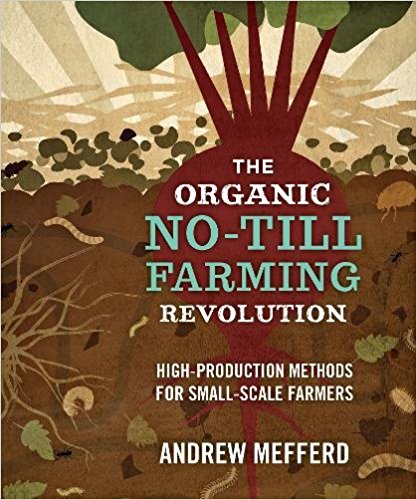
Andrew Mefferd just wrote a book about No-Till Farming
I’ll just say no-till is great for bees too, for example squash bees
not just moisture retention
Final question- if there was one change you would like to see to create a greener world what would it be? For example is there a charity or organization your passionate about or a project you would like to see put into action. What do you feel is the most crucial issue facing our planet in regards to the environment either in your local area or on a national or global scale?
I do think, in a round about way, I feel strongly about it. I do think one of the problems is when it comes to pollinators
create some bridges
its going to have to involve a lot of land managed in a specific way which all gets bond up in things like farm income and all the kind of problem that are there in land management
When I first got here there were a lot of land managers who were not just enthusiastic about bees and it was hard to talk to them
where the people managing the land
their businesses were surviving
Need to build a bridge
a lot of uncertainty
I can give you some rough ideas of what a garden ought to be but there’s a lot to know
land managers who are skeptical you are going to wreck their businesses
passionate
people see those things come together
one of the most stunning moments I had was out in Eastern Wasthington being at a potato meeting
growers din’t need bees for pollination and they were suspicious of us being a bunch of environmentalists
We brought a bunch of bees
various places in the state
saw them
diversity of colors
saw the
appeal that can be made
We could get people on board without going after them
start maybe something along the lines of
this is an endowment we have
A right across the US
up in Canada
a lot of them do pollination
maybe aren’t
Aren’t they amazing!
can we all get behind that? Maybe some modest give and take
opening up dialogue
don’t make assumptions about what people think
if my job has shown me anything I’m always being surprised by people!
I love getting along with people and building a conversation I think that’s encouraging if we keep an open mind.
How do we connect with you?
pollination
anywhere
we have a
blanket initiative here in Oregon
The Oregon bee project we have lots of tools and resources
I can send you a link
How did you start your podcast?
It’s ind of a funny story! I thought I was going to Webinar on Fire and learn how to make webinars and mike would teach people how to garden via youtube and webinars and IDK I just fell in love with podcasting I love my shows and my guests. We’re all dedicated to the creating a green future and environment.
I am the organic eater, not as much the gardener. This year my goal is to plant more raspberries and blueberries and then strawberries in 2020, I talk a lot about starting small and make it convenient. I talk a lot about the compost pile outside my kitchen window, I also talk a lot about clean garden jobs, it’s very forgiving. I struggle with watering. There will be days in the summer where I don’t even see the garden for 5 days.
I interviewed David Schemterrling in Missoula, ou would never believe there in the middle of a city, but they have this native yard they grow the only water is for the specialty peppers and thai basil that they like to cook with.
My husband is always laughing at me because I’m like I want to start planting these native plants and my husband’s like just go outside the fence because he’s been building a fire break around the show.
What are some of your favorite bee episodes?
Treatment Free Bees
One of my favorities’ was with Jacqueline Freeman from Washington, a lot of beekeepers on my show have talked about different ways to deal with mites. She said it’s like setting off an explosion when you dust for the mites she talks a lot about getting a healthy hive naturally.
I also talked to Olivia Shangrow from Rent Mason Bees.
I love when my listeners come on they make great guests. Care Bellamy down in Florida started this program the Sustainability Project
And then GloryBee
and I feel like I’d be remiss not to mention Patti Armbrister who basically has her own fan club on my show and she has just talked about so much she’s an amazing teacher. I want to say she’s middle school and high school, FFA person and just a wealth of knowledge. I met her because of my podcast.
I think the coolest thing about my podcast, I’ve met neighbors that live a mile from me, and then there are people in the Facebook group from Kenya and Russia and Australia. The number one theme on my show is it all comes back to soil health.
I think about one element the pollinators. It’s all got to work together.
Bringing in beneficial insects, a lot of the same thing for bringing in bees is how to bring in beneficial insects which will help reduce your pests. The number one question I got last year was what do I spray on my organic lawn and I talked to AJ Olson down in Texas he says mix molasses with water.
What would you say
The 3 biggest questions I get are:
How to get things to be more productive – how to get more things to grow. My most looked at page according to google analytics is what crops to grow in NW Montana.
the big one is how do you pollinate the crop to get more out of them.
How do I attract pollinators so I’ll get more fruit on their trees. Like Mike struggled for a long time with eggplants, he would get these giant purple flowers but no fruit so how to get that work.
- How to attract beneficial insects to reduce pests
- How to use cover crops compost and manure to improve your soil health
- How to grow 20% more with less labor
Yeah you can get more production
- Soil health bees living in that soil, good health is important
- pest management without having impacts on pollinators
- sounds like we have similar concerns.
You’re podcast runs how frequently.
I try to put out a new episode on Mondays, and I was trying to put a replay out on Thursdays. I get picked up on PRN on Monday nights, that’s been helpful for me, having to have a new show to them every week has helped. Pretty much consistently.
Our website is just https://organicgardenerpodcast.com/
Please support us on Patreon so we can keep the show up on the internet. It cost close to $100 a month just to keep it up on the internet for the website etc so if you could help by supporting it with an $8/month contribution or $10/month to join the Green Future Growers Book Club where we can delve deep into some of the best gardening books that have been recommended on the show! GoDaddy even is bugging me for dollars just to have the domain name…
https://www.patreon.com/OrganicGardenerPodcast
The Organic Gardner Podcast is sponsored by Health IQ, an insurance company that helps health conscious people like runners, cyclists, weightlifters and vegetarians get lower rates on their life insurance. Go to healthiq.com/OGP to support the show and see if you qualify.
Over half of Health IQ customers save between 4-33% on their life insurance.

- Health IQ uses science & data to secure lower rates on life insurance for health conscious people just like you green future growers! Like saving money on your car insurance for being a good driver, Health IQ saves you money on your life insurance for living a health conscious lifestyle.

To see if you qualify, get your free quote today at healthiq.com/OGP or mention the promo code OGP when you talk to a Health IQ agent

Now Let’s Get to the Root of Things!
We’d love if you’d join Organic Gardener Podcast Facebook Community!
The Organic Gardener Podcast is a participant in the Amazon Services LLC Associates Program, an affiliate advertising program designed to provide a means for sites to earn advertising fees by advertising and linking to amazon.com
If you like what you heard on the Organic Gardener Podcast we’d love it if you’d give us review and hopefully a 5 star rating on iTunes so other gardeners can find us and listen to. Just click on the link here.
and don’t forget if you need help getting started check out our new
Free Garden Course.com
Free Organic Garden Course
Remember you can get the 2018 Garden Journal and Data Keeper to record your garden goals in our
You can download the first 30 days here while you’re waiting for it to come in the mail.
We’d love if you’d join Organic Gardener Podcast Facebook Community!
If you like what you heard on the Organic Gardener Podcast we’d love it if you’d give us review and hopefully a 5 star rating on iTunes so other gardeners can find us and listen to. Just click on the link here.





